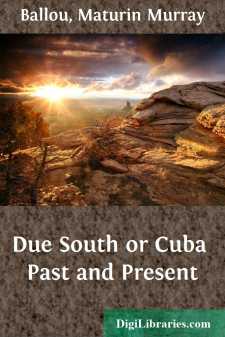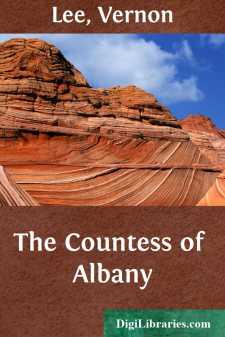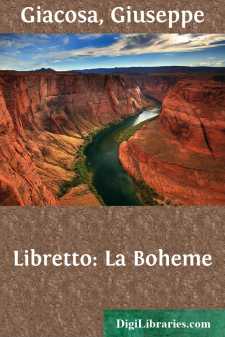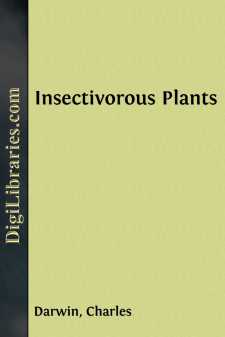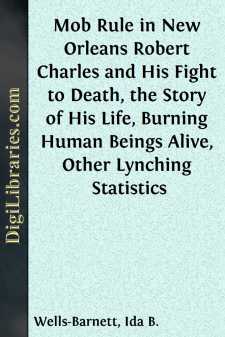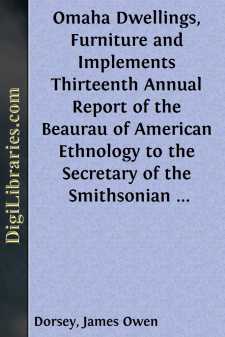Non-Classifiable
- Non-Classifiable 1768
Non-Classifiable Books
Sort by:
by:
Calvin Thomas
PREFACE I have wished to give a trustworthy account of Schiller and his works on a scale large enough to permit the doing of something like justice to his great name, but not so large as in itself to kill all hope and chance of readableness. By a trustworthy account I mean one that is accurate in the matters of fact and sane in the matters of judgment. That there is room for an English book thus...
more...
CHAPTER I.Departure. — On Board Ship. — Arrival at Nassau. — Capital of the Bahamas. — Climate. — Soil. — Fruits and Flowers. — Magic Fertility. — Colored Population. — The Blockade Runners. — Population. — Products. — A Picturesque Local Scene. — Superstition. — Fish Story. — The Silk-Cotton Tree. — Remarkable Vegetation. — The Sea Gardens. — Marine Animal Life. —...
more...
by:
Vernon Lee
In preparing this volume on the Countess of Albany (which I consider as a kind of completion of my previous studies of eighteenth-century Italy), I have availed myself largely of Baron Alfred von Reumont's large work Die Gräfin von Albany (published in 1862); and of the monograph, itself partially founded on the foregoing, of M. St. René Taillandier, entitled La Comtesse d'Albany, published...
more...
by:
Giuseppe Giacosa
SYNOPSIS The opera is founded on Henri Murger's book "La Vie de Bohème." ACT I Rudolph and Marcel are sitting in the latter's attic-studio in the Quartier Latin, in Paris. Marcel is absorbed in his painting. The day is cold. They have no money to buy coal. Marcel takes a chair to burn it, when Rudolph remembers that he has a manuscript which has been rejected by the publishers and...
more...
by:
Jacob Abbott
CHAPTER I. INFANCY. King Charles the Second was the son and successor of King Charles the First. These two are the only kings of the name of Charles that have appeared, thus far, in the line of English sovereigns. Nor is it very probable that there will soon be another. The reigns of both these monarchs were stained and tarnished with many vices and crimes, and darkened by national disasters of every...
more...
by:
Charles Darwin
Enamel and Dentine.—As the secretion decalcified ordinary bone, I determined to try whether it would act on enamel and dentine, but did not expect that it would succeed with so hard a substance as enamel. Dr. Klein gave me some thin transverse slices of the canine tooth of a dog; small angular fragments of which were placed on four leaves; and these were examined each succeeding day at the same hour....
more...
by:
George Gissing
SPRING I. For more than a week my pen has lain untouched. I have written nothing for seven whole days, not even a letter. Except during one or two bouts of illness, such a thing never happened in my life before. In my life; the life, that is, which had to be supported by anxious toil; the life which was not lived for living’s sake, as all life should be, but under the goad of fear. The...
more...
INTRODUCTION Immediately after the awful barbarism which disgraced the State of Georgia in April of last year, during which time more than a dozen colored people were put to death with unspeakable barbarity, I published a full report showing that Sam Hose, who was burned to death during that time, never committed a criminal assault, and that he killed his employer in self-defense. Since that time I...
more...
DWELLINGS. The primitive domiciles of the Omaha were chiefly (1) lodges of earth or, more rarely, of bark or mats, and (2) skin lodges or tents. It may be observed that there were no sacred rites connected with the earth lodge-building or tent-making among the Omaha and Ponka. Earth Lodges. When earth lodges were built, the people did not make them in a tribal circle, each man erecting his lodge where...
more...
by:
John Morley
CHAPTER I.OTHER DIALOGUES. We may now pass to performances that are nearer to the accepted surface of things. A short but charming example of Diderot’s taste for putting questions of morals in an interesting way, is found in the Conversation of a Father with his Children (published in 1773). This little dialogue is perfect in the simple realism of its form. Its subject is the peril of setting one’s...
more...



